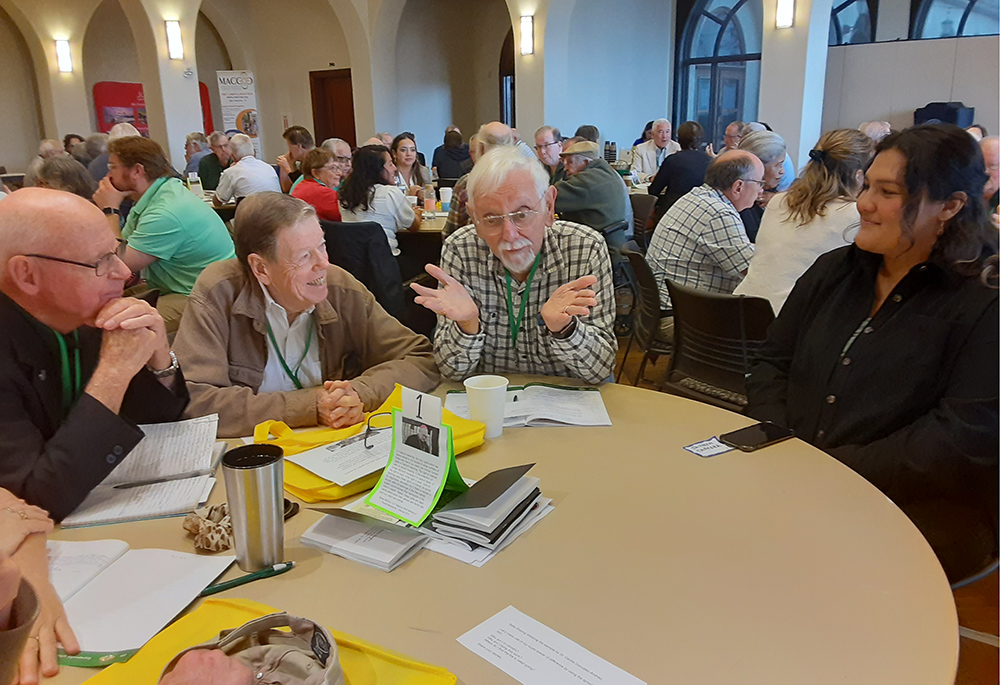
Vincentian Fr. Louis Arceneaux of New Orleans explains his ministry as a priest during a table discussion at the annual assembly of the Association of U.S. Catholic Priests on June 14 at the University of San Diego. (Dennis Sadowski)
When her son Andrés, then 19, came home for a weekend visit after his first week living in the dormitory for first-year students at Loyola Marymount University visibly upset, Cecilia González-Andrieu was quick to find out what was bothering him.
"He started crying," González-Andrieu, now professor of theology and theological aesthetics at Loyola Marymount, told the audience of priests and laywomen gathered June 14 on the third day of the annual assembly of the Association of U.S. Catholic Priests at the University of San Diego. " 'Mama,' " he told me, " 'it's so awful how the kids in my dorm make these terrible messes, they throw trash everywhere, they waste food.' "
Young Andrés was ecologically conscious, so obviously the waste was a concern, she thought.
"But surprisingly he continued, 'Someone has to clean up after them, and she's a nice lady, Mama, a little Latina señora.' His eyes red, he added, 'She looks like you. The other kids don't see her. She's not a person to them.'
"My son was grieving the denial of human dignity to women workers because his own blood called to him, his sense of fairness called to him, and seeing me in them and them in me engendered compassion in him," González-Andrieu said.
Her son's experience can serve as a reminder of the need to truly see "la realidad" — the reality of life — of marginalized people, and women especially, as the Catholic Church continues its three-year journey exploring Pope Francis' invitation to synodality, she said.
Synodality, González-Andrieu explained, is meant to highlight the rich diversity of the voices and talents of the people of God. Her talk turned to the word "difference" and how through the diversity of people and cultures and animal and plant life "God's creation loves difference."
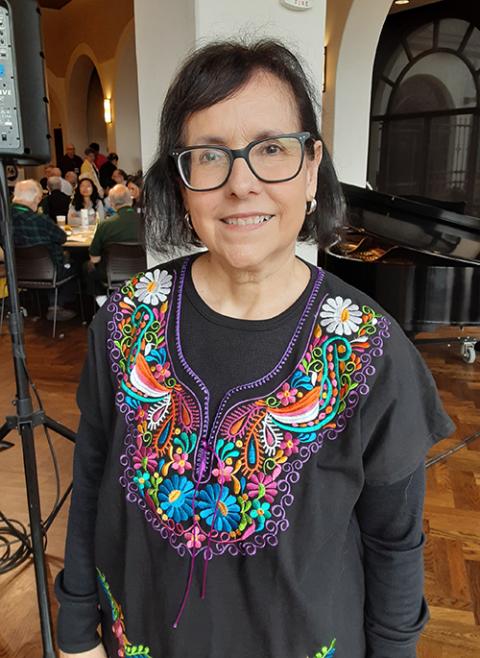
Cecilia González-Andrieu, professor of theology and theological aesthetics, Loyola Marymount University (Dennis Sadowski)
"As a church, we can make difference our super power. That's where synodality comes in. Synodality is the tool that reveals the colorful variety of all that is and allows us to use those very colors to craft a new and hope-filled vision," González-Andrieu said.
Each person has gifts to bring to the church and González-Andrieu urged that the gift of women in particular be more widely welcomed within the church, including in ordained ministries.
As a woman, she lamented, she is ineligible for the diaconate or the priesthood.
"As such, my genetic makeup, what is inscribed in my cells by biology, makes it so I am kept from preaching, or baptizing, or exercising an ordained ministry that is assured to others simply because of their genetic makeup.
"Is it possible that centuries of erroneous theories about who women are, of wrongheaded assumptions about women's abilities, and of power structures seeking to subjugate women, have resulted in a church that has effectively silenced the Holy Spirit? The difference of being a woman in a church that rejects our gifts and our calling causes me, and my sisters, a level of grief that is difficult to describe to others because it runs so deep."
In an act of synodality, leaders of the Association of U.S. Catholic Priests, or AUSCP, in collaboration with Ellie Hildalgo and Casey Stanton, co-directors of the organization Discerning Deacons, welcomed 40 women serving in various ministries and leadership roles in parishes and the Diocese of San Diego chancery to hear González-Andrieu and participate in the table discussions that followed her address. Each person was asked to share why they were in ministry, the specific work they were doing and where they find the "fire to keep doing this work."
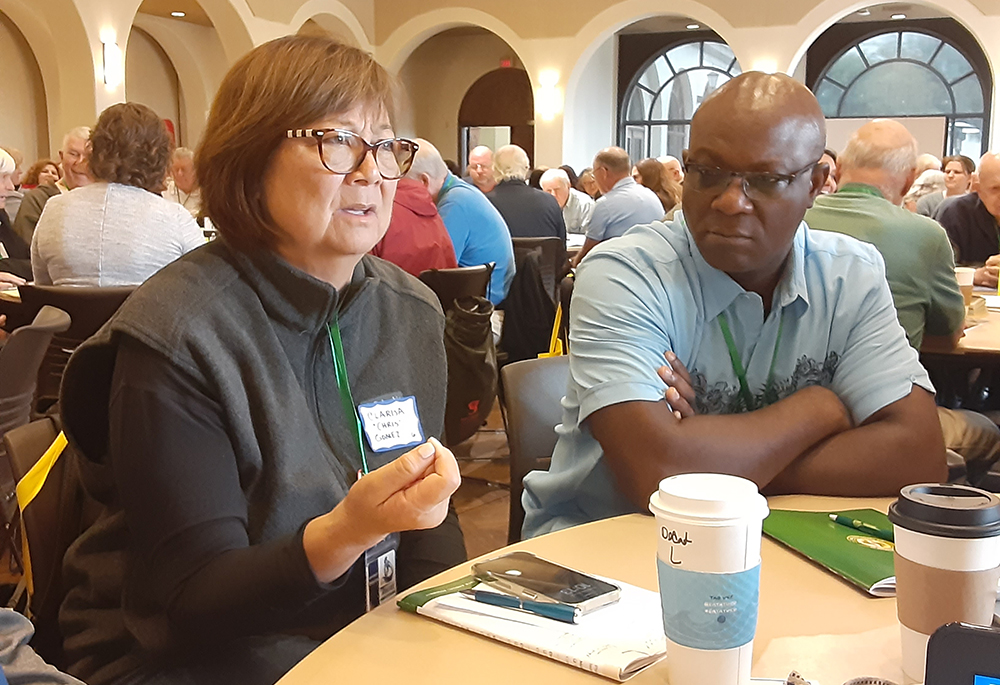
Clarisa Gomez of San Diego explains her ministry in the context of synodality during a table discussion during the annual assembly of the Association of U.S. Catholic Priests on June 14 at the University of San Diego. At right is Fr. Kwane Assenyoh, parochial administrator of St. Charles Borromeo Parish, Livermore, California. (Dennis Sadowski)
Clarisa Gomez, who has worked in pastoral ministry at The Immaculata Church on the USD campus, said she "felt truly called to the work that I do. It's joyful work, even at times it is frustrating. The challenge for me sometimes is to respond with love and not sometimes feel like Martha."
In her role, she said she initially had not thought about the ordination of women, but that her feelings are beginning to change.
"I started asking myself why can't women be at the pulpit. For the first time I'm really thinking about why not. God is constantly creating. Priests can't do it all. Our expectations [of them] are getting in the way," she said.
Fr. Kwame Assenyoh, parochial administrator of St. Charles Borromeo Parish in Livermore, California, in the Diocese of Oakland, called for parishes to implement some of the ideas presented in the listening sessions held in advance of the October 2023 and October 2024 Synods of Bishops, rather than waiting on the expected final report from Rome.
"Practice precedes theology," he said. "We should not wait for Rome to come out with a big book before we start doing things."
Synodality explored
The assembly explored the theme "Unity Through Synodality," hearing from speakers who addressed the historical context of synods throughout church history and the contrasts between acts of synodality in other countries and the U.S.
Massimo Faggioli, professor of theology and religious studies at Villanova University, explored efforts at synodality in Australia and Germany that began years prior to Francis' announcement of the current synodal process in 2021.
He said efforts by Australian prelates are notable for allowing widespread input into reforms in response to the clergy sexual abuse scandal. The Australian Catholic Bishops' Conference and Catholic Religious Australia established the Truth, Justice and Healing Council to shape the church's response to the recommendations of the Royal Commission into Institutional Responses to Child Sexual Abuse.
Headed by a layman who formerly served as secretary general of the Australian Medical Association, the church council is a "creative response" to the abuse crisis and the commission's recommendations, said Faggioli, who served as a consultant in its development.
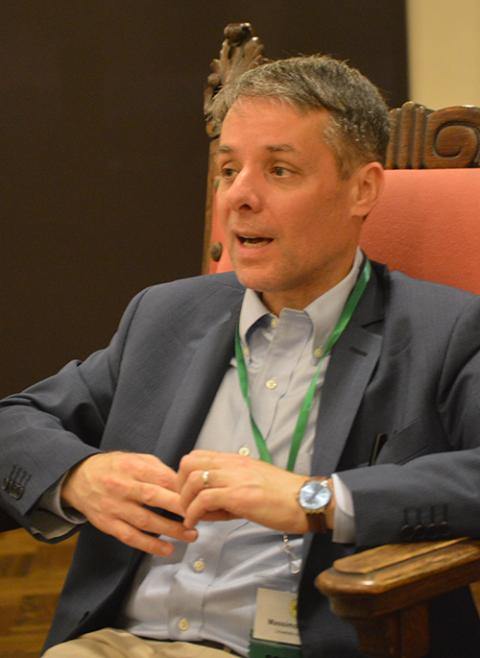
Massimo Faggioli, professor of theology and religious studies at Villanova University, waits to answer questions after his presentation on the synodal process June 12 during the annual assembly of the Association of U.S. Catholic Priests at the University of San Diego. (Association of U.S. Catholic Priests/Paul Leingang)
In Germany, the Synodal Path, which launched in 2019 in response to the clergy abuse crisis, has led to widescale consultation between bishops and laypeople. Faggioli said the German Catholic Church is "comfortable" with the history of the Second Vatican Council and the long history of church councils and synods dating back centuries.
Such comfort is allowing German Catholics to explore reforms, he said. During a March meeting that is part of the Synodal Path process a majority of bishops and laity agreed to call for the church to approve blessings of same-sex unions and approved asking Rome for the ordination of women deacons.
The actions in Germany are unlikely to occur elsewhere but indicate a willingness of a church entity that is "large, powerful and wealthy" to "put on paper and approve things that until a few years ago could get you fired as a theologian or bishop," Faggioli said.
In contrast, the synodal process has been met with less openness in the U.S. and Faggioli pointed to the lack of significant consultation with theologians or the establishment of a national committee of lay Catholics as part of the American effort. The U.S. church remains under a "very strong episcopal leadership," limiting discussion on matters of concern to the wider church, he said.
"There is a mistrust of synodality, which in this country is a mix of clericalism and technocracy," he explained. "I believe technocrats should be more afraid of synodality than bishops are. It's not just about the bishops. Synodality is exactly the opposite of the theology of the market."
Advertisement
In another presentation, Brian Flanagan, whose tenure as associate professor of theology at Marymount University in Arlington, Virginia, ended in June when the school reduced its liberal arts offerings, said the church has a long history of synodality, dating to the Council of Jerusalem in the first century.
Such councils have involved discussions that led to consensus on charting a path forward, he said, acknowledging that the same can be said of Francis' call to synodality today.
"It is aiming at the idea that this is not a 51% to 49% parliamentary democracy. It's aiming at the idea that we should be getting to the point that we should agree enough to say how we agree and if we can't, then the commitment is to remain part of the conversation until we can," Flanagan told the assembly.
"It's a very hard way of doing church. It's a very challenging way, but it also might be the way we can actually make space for the Holy Spirit."
Table discussions followed the presentations, allowing priests and others in attendance to discuss what was said and describe their experiences with the synodal process in parishes, potential concerns and roadblocks to synodality in the U.S.
Despite widespread welcome of synodality, priests readily identified concerns about its future. They cited efforts among some diocesan bishops to downplay its effectiveness, to limit participation in listening sessions or to diminish ideas that emerged in conversations regarding liturgy, ministry, management and the role of laity, particularly women, within the church.
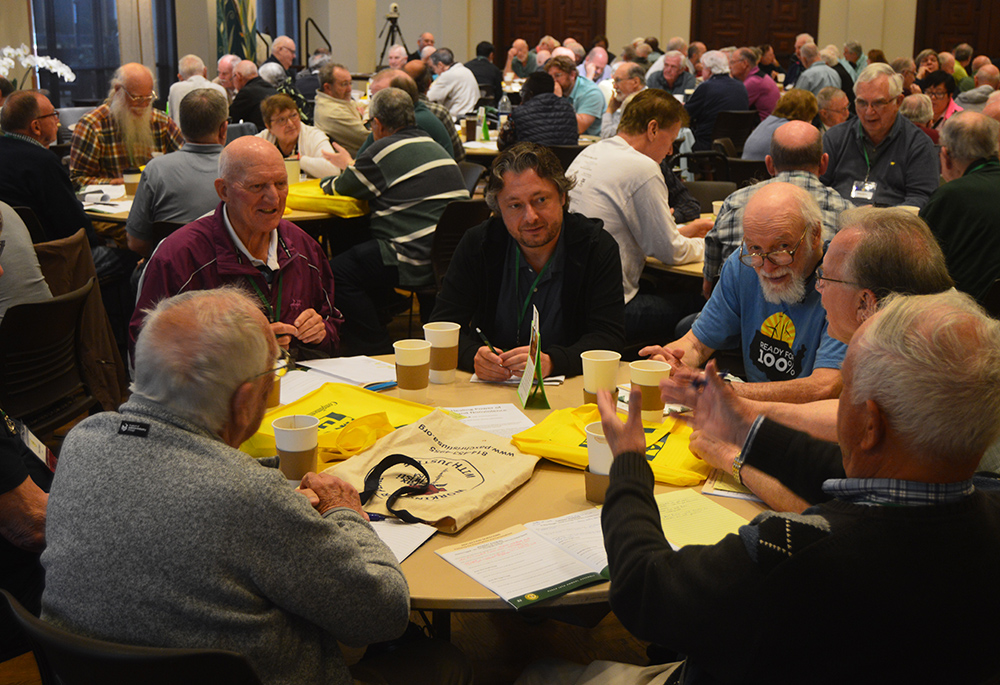
Table discussions following presentation by Brian Flanagan, former associate professor of theology at Marymount University in Arlington, Virginia (Association of U.S. Catholic Priests/Paul Leingang)
Still, priests widely acknowledged the synodal process stems from Vatican II and said synodality can bring about the full realization of the council's conclusions in the years ahead. They have used the listening sessions to begin strategic and pastoral planning initiatives with laypeople as collaborators.
"Synodality is not just keeping [the council] alive but growing it. Synodality is a continuation of the moving forward of the spirit of God in the church," said Fr. Bob Nee, a retired Archdiocese of Boston priest.
In a nod to critics of the synodal process, Fr. John Grace, pastor of Immaculate Conception Parish in Hampton, Virginia, described the plan laid out by the pope as "something that is not new and gimmicky but rather we are tapping into a much deeper sense of being the body of Christ."
"We can no longer think in terms of 'my' ministry. We have to think collectively especially in a new generation who will not even engage with the church," he said.
However, Fr. John Judie, a retired priest in the Archdiocese of Louisville, Kentucky, expressed concern that people who feel hurt by the church, including African Americans, are not going to fully trust the synodal process. He called for stronger efforts to heal the wounds of those who "are not receiving the healing they need."
"Jesus was always going to people who were hurting. But he spent his time with the people no one else would deal with. He did something to give them healing, and restoration and a sense of hope in society," said Judie, who is leading an AUSCP effort to address racism.
Calls to conversion
During a vesper service to open the assembly June 12, Cardinal Robert McElroy of San Diego styled the steps toward wider collaboration and participation in the church among the faithful as "calls to conversion."
"God is saying to us a rebirth is possible to become more like the church we are called to be, a church rooted in the word of God, discernment of the Holy Spirit and the Eucharist, and participation and collaboration and witness in missionary outreach and inclusion. And as God calls us to be this church in these coming months, let us have a sense of genuine hope for what the possibilities are," McElroy said.
He described the church's role of being pastoral in its ministry as central to the pope's focus on synodality.
"I think he says to us this is the centerpiece of the life of the church. Sometimes people will contrast and say, 'Well, doctrine comes first.' Doctrine is in service to the pastoral service of the church. It cannot be erected in opposition to it or without reference to it without being more deeply and profoundly in the pastoral mission of the church," McElroy said to applause.
"The mission of the church is to preach the Gospel, to inspire people to aspire to the values of the Gospel, and to understand the hearts and souls of those who suffer," he added.
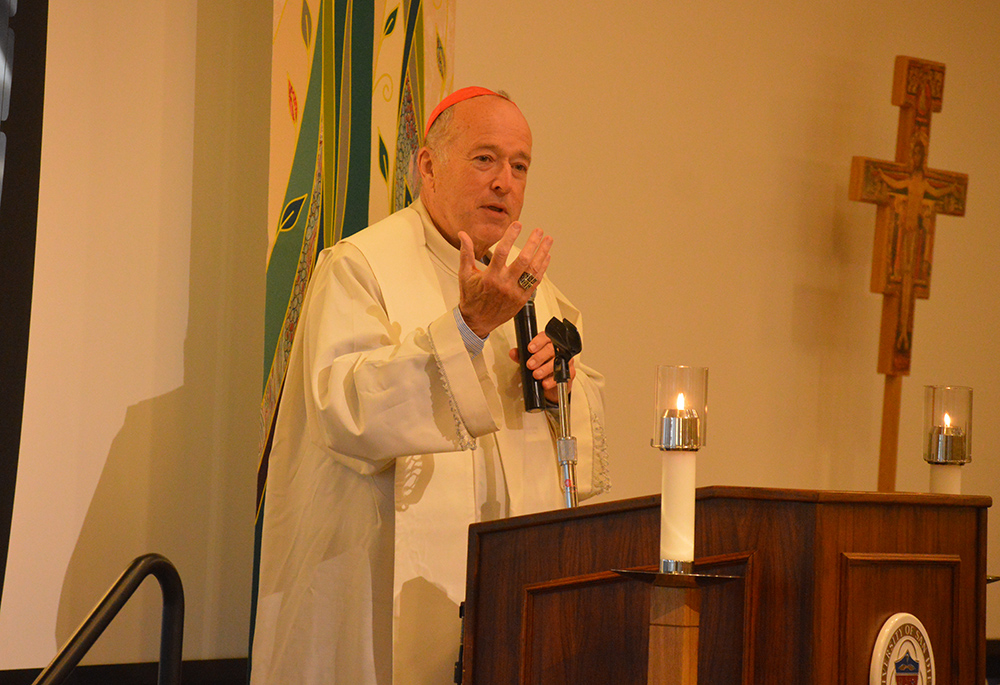
Cardinal Robert McElroy of San Diego presides during evening vespers June 12 to open the 12th assembly of the Association of Catholic Priests in San Diego. (Association of U.S. Catholic Priests/Paul Leingang)
In a formal action, the priests' assembly approved a statement calling on the U.S. bishops "to offer fraternal, pastoral affirmation of their gay priests and their ministry."
The statement asks the bishops "to admit all candidates for seminary formation and priesthood according to the same criteria: a mature and balanced personality, capable of establishing sound human and pastoral relationships, a full working knowledge in theology and the living tradition of the Church, a solid spiritual life, and a love for the Church."
The AUSCP also called on the bishops to publicly call for continuing development of church teaching on human sexuality, drawing from work in the human and social sciences, biblical scholars and theologians and in conversation with LGBTQ people.
The priests' group encouraged the bishops to provide gay priests with "a safe environment to be who they know themselves to be" and to accept that "the issue is sexual maturity and integration, not sexual orientation."
While acknowledging the number of faithfully serving gay priests in the U.S. is "unknown but significant," the statement concluded that they have "unjustly suffered from the formal ecclesial situation in which they find themselves."
Finally, the statement said, gay priests share the struggle alongside other LGBTQ people with teachings that describe homosexuality as "objectively disordered."
Acknowledging that the church calls LGBTQ people to chastity, priests have publicly promised to remain chaste, the statement said.








